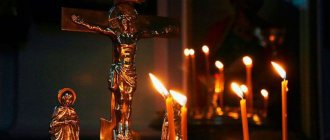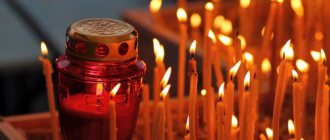Commemoration of the dead in Orthodoxy
Commemoration of the dead is a special custom among Orthodox Christians. In Orthodoxy, the numbers 3, 9, 40 have sacred meaning, so these days are special for commemoration. According to church traditions, after death you need to remember a person in order to help the deceased find peace with your prayers. After leaving earthly life, the soul of the deceased is in search of its path to a new life. She is looking for her new home in the other world. By remembering a person and praying for him, neighbors ease the fate of the deceased and help the soul find peace.
What to bring to church for a funeral service
A memorial service is a process carried out on the day of the funeral, on the third, ninth and fortieth days. It is celebrated on the birthday, anniversary and name day of the deceased.
Funeral products should be placed on the funeral table. These include the following offerings:
- various bakery products;
- flour, cereals, vegetable oil;
- tea, juices;
- canned food;
- Cahors;
- jelly.
The most common dish is kutia. Traditionally it is made from wheat and honey, however, recently its main ingredients are rice and raisins.
What not to bring:
- meat and meat products;
- expired products;
- strong alcohol (only Cahors is allowed).
Products brought to church for a memorial service are a gift to God, so you should approach this issue responsibly.
Funeral service for 9 days after death
In Orthodoxy, Christians have a tradition of honoring the memory of the deceased for nine days from the moment of departure. There are special customs for remembering the deceased, which are extremely important to observe, because these are traditions established over time. Adhering to these traditions and rituals is important not only from a religious point of view, but also for the peace of mind and balance of the family of the deceased.
Necessary funeral rituals for 9 days after death:
- going to church;
- performing a service (memorial service, lithium, funeral service, magpie);
- reading a prayer (in church or at home);
- visiting a grave;
- funeral lunch.
Memorial Day Ninth
Church traditions of commemoration on special dates have been established for centuries, and it is extremely important to observe them. How to remember for 9 days after death? What should family members and loved ones of the deceased do on such a day? Needless to say that this entire mournful period should take place in constant prayer at home? And the memorial day itself should look like this:
- visiting church and performing services there;
- visiting the burial site;
- funeral meal.
Commemoration of destinies in church should be done on this very day - not earlier and not later, given its importance for the soul of the deceased. And the “table” commemoration can take place on any other convenient day.
What to do in church
On day 9, you must first come to church. The church day begins at six in the evening, so a note to be remembered at the proskomedia must be submitted on the eve of the 9th day or early in the morning, before the start of the service.
Orthodox relatives must attend the nine-day funeral service. This could be a lithium (short commemoration) or a memorial service.
It is necessary to order a magpie for repose (if for some reason it was not already ordered on the day of death), and a piece of prosphora is taken out for the deceased at the proskomedia.
Then, at the icon depicting the crucified Christ, you need to cross yourself and light candles for the repose. The candle is lit from already burning candles or from a lamp and placed on a candlestick. At the same time, they turn to God with a request to rest the soul of a loved one, calling his full name given at baptism. After this, you should cross yourself again, bow in front of the icon and move away from the candlestick.
Those who die before the expiration of 40 days are called newly deceased. The candles that you place in the temple will symbolize a collective common request - a prayer for the newly deceased (name).
What to do at the grave
Alcohol is not acceptable at a wake.
According to tradition, after a church memorial, those present at the service visit the cemetery. Flowers are laid at the grave and a lamp is lit. If a priest is invited, he will serve the litia, and if he is not present, the “Our Father” is read. Someone can talk out loud about the positive aspects of the deceased, or you can simply mentally remember him. Visiting a cemetery is incompatible with conversations on extraneous worldly topics.
a funeral meal at the grave, and even with the drinking of alcoholic beverages, is completely This custom, which comes from pagan times, can greatly harm the state of the soul of the deceased.
Food should not be left at the grave either. It is better to offer sweets, cookies, and pies to the poor or beggars with a request to remember the newly deceased.
When planning to leave the cemetery, be sure to turn off the lamp to prevent the wreaths on the grave from catching fire.
Why do funerals last for 9 days?
The commemoration of the deceased is held for 9 days after death in honor of the nine angels who protect the soul of the deceased and ask the Almighty for its salvation. Following Orthodox tradition, the purpose of a memorial service is to help the deceased find his new home. The ninth day after a person’s departure is a very important period for family and friends. According to church customs, the transition of the soul of the deceased to the Kingdom of Heaven depends on them. With their prayers, relatives can help the soul of the deceased find peace.
Who is invited
Traditionally, nine days of wakes are considered uninvited. It is important that people come of their own free will. Inviting or reminding about this date is not customary in Orthodox traditions. However, in the modern world, people are often invited to funerals in order to plan and resolve organizational issues in advance. Sometimes the relatives of the deceased themselves casually remind about this event, thereby, without breaking traditions, they warn in advance about their arrival. If a large number of people are expected, then the memorial is held outside the home, for example, in a restaurant.
- 5 delicious recipes for salting fish at home
- Subcutaneous mites on the face - what is it and how to treat
- Sberbank instant card
What's being cooked
The most common dish that is prepared for a funeral for 9 days is kutia: boiled wheat seeds, to which something sweet is added, such as sugar or honey. Seeds are a symbol of life, and sugar or honey is the sweetness of life after death. Instead of kutya, you can prepare another porridge, for example, rice. It is customary to place compote or jelly on the funeral table for 9 days. Sometimes at funeral meals you can see pancakes, pies, various fish dishes, cutlets, and also borscht. According to Orthodox customs, the funeral meal should be without alcohol.
What to do for 9 days
Commemoration for 9 days after death is the day when the deceased is remembered and only good things are remembered about him. During this period, it is not customary to organize mourning gatherings or, conversely, to organize a joyful feast. It must pass quietly, and the family of the deceased must behave humbly. In addition, there are a large number of different customs that need to be taken into account.
Funeral customs 9 days:
- There should be a slice of bread and a bowl of water at home from morning to night.
- You need to light a candle or lamp next to the photograph of the deceased.
- You need to visit the cemetery of the deceased, but you cannot arrange a funeral right in the middle of the cemetery.
- The funeral meal should be modest, without excesses.
- Food left over after a funeral meal should not be thrown away. The remaining food should be distributed to the poor and homeless people.
- On this date, you need to give out alms, give lunches to the poor, and help those in need.
Prayer
Correctly commemorating the departed on the 9th day means praying for them. Despite the pain and bitterness of loss, you need to realize that prayer will help the deceased more than tears. It is important to let go of your loved one so that his soul can find peace in the afterlife. It is extremely necessary to pray for the mercy of the Almighty towards the deceased, because if they pray for the deceased, it means there is something good in him. Therefore, it is important to visit the temple and order a magpie for the departed. Before the funeral meal, it is extremely necessary to read the rite of lithium about the deceased.
What is necessary
If you decide to order a prayer service in a church, then you should know that it is not customary to come there empty-handed. Often such offerings are considered alms. Most often they bring:
- wine;
- vegetable oil;
- confectionery and bakery products;
- sugar;
- fruits and vegetables;
- cereals;
- eggs.
Meat products are prohibited. Everything should also be fresh. It is mainly customary to commemorate kutya with honey and other sweets.
When is a funeral service ordered? Often this is done on the very day when the date of departure falls. But some people think that it is possible in advance. You shouldn’t do this, because the day before the person was still alive and happy.
How to count 9 days after death
According to Christian canons, commemoration on the 9th day after death is an important event, so you need to correctly calculate the date on which it falls. In order to correctly count nine days, you need to start the report directly from the day the deceased left. The first day should be considered the day of death itself, and not the funeral. Nine days inclusive from the moment of death must be counted only if death occurred before midnight. If the death occurred after midnight, then they begin to count from the next day inclusive.
What is on the table
The funeral dinner must certainly include traditional kutia - boiled wheat grains with sugar or honey, which must be consecrated in the temple. If this cannot be done, the kutya is sprinkled with holy baptismal water three times.
Since different regions have their own customs, sometimes they prepare rice or corn porridge, garnishing it with raisins; in some places these are pieces of white bread soaked in honey water.
The most common set of dishes is:
- Funeral table. borsch;
- thin pancakes with poppy seeds, cottage cheese, and sometimes liver;
- canapés with sprats;
- fish snacks;
- vinaigrette salads;
- cutlets or cabbage rolls;
- boiled potatoes;
- pies (most often with poppy seeds or apples);
- drinks: jelly, compote or kvass.
Cookies and sweets are also on display, with which those present came to the funeral.
In general, it is appropriate and even customary to prepare the favorite dishes of the newly deceased. This is also a kind of peculiar kind of memory of him.
It may happen that 9 days fall during the fasting period. Then the entire meat menu should be replaced with fish, and the same cabbage rolls should be prepared with vegetables, with mushrooms instead of meat.
Alcohol can cause behavior inappropriate for the occasion, therefore its presence on the table is categorically not welcomed by the church. We must remember that drunkenness is a great sin, but at funerals, people, on the contrary, pray for forgiveness of all sins.
The question often arises of what should be carried by those going to the 9-day remembrance. Flowers are brought to the grave, and red wine, sweets, and cookies are appropriate for the table. It is acceptable to remember the deceased with three traditional glasses of red wine.
At the table
The meal should begin with prayer.
They begin the funeral meal with the prayer “Our Father” and end it with it. After this, everyone present puts a couple of spoons of kutya on their plate and eats it before the meal begins. Those gathered remember the person who has passed away quietly and kindly. There is no need to talk about unseemly actions or not the most pleasant character traits of the deceased.
We are all not angels, just as the deceased was not an angel, and the church does not recommend focusing attention on this, so as not to harm his soul during this crucial period for it.
As mentioned, prayers are read during the meal, therefore the ladies’ heads should be covered with handkerchiefs or scarves, and not necessarily black ones. Only those close to the deceased can have such as a sign of deep mourning. Men, on the contrary, stand in prayer with their heads uncovered.
You should not linger at the table for a long time, so as not to turn the funeral dinner into a banal feast.
It is possible that more dishes were prepared than people came. Then everything that remains should be distributed to those who are poorer, or simply to the poor, asking them to remember the deceased.
Commemoration on the 9th day after departure into another world helps the soul of the deceased to appear before the throne of God with understandable fear and trembling. Accompanied by her guardian angel, she has already become acquainted with heaven, and after a conversation with the Almighty she will go on a further journey - to hell. Her fate has not yet been finally determined, and therefore it is within the power of her friends and relatives to support her with prayers and memories of the good deeds done by the deceased and help her rest in the Kingdom of Heaven.











